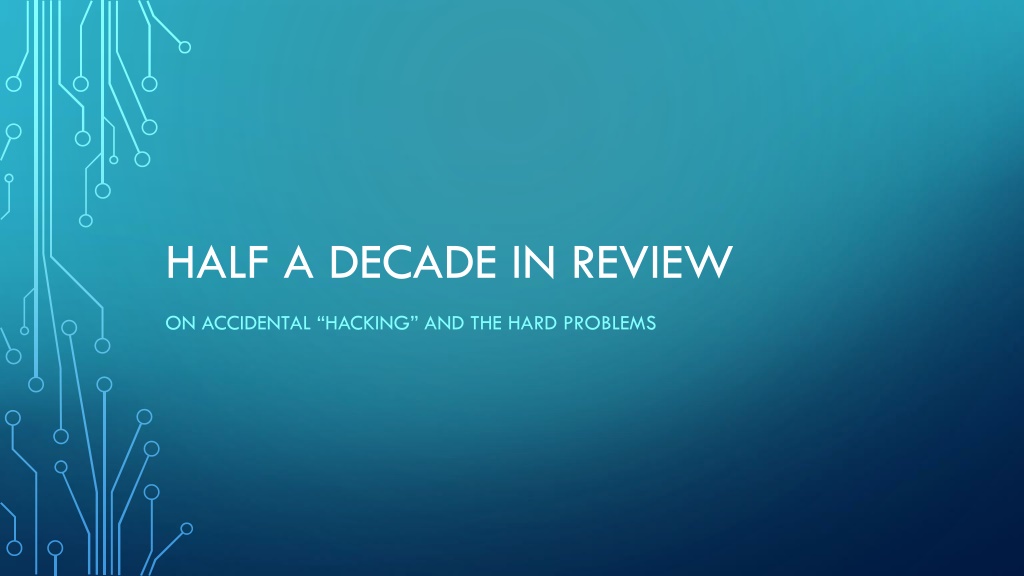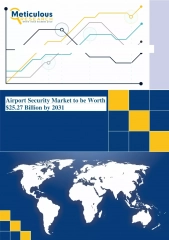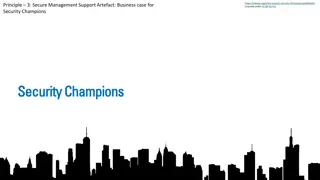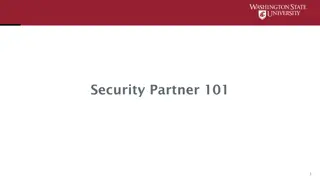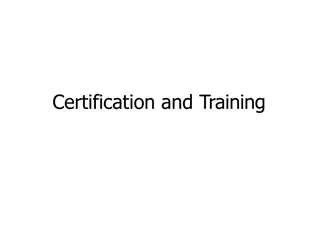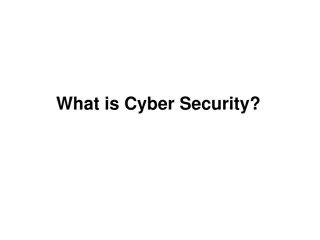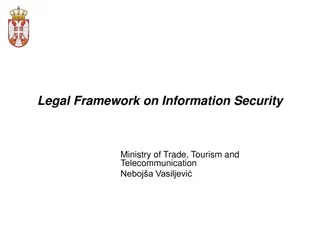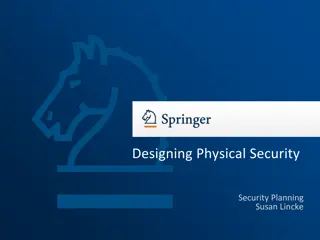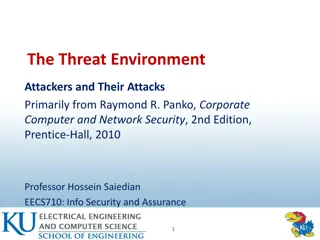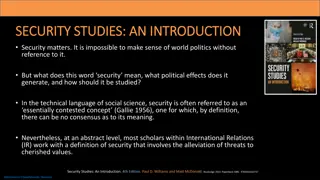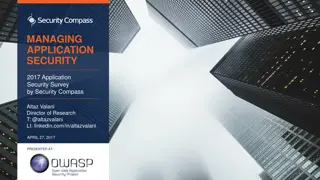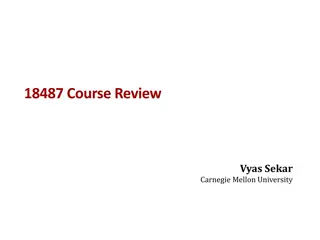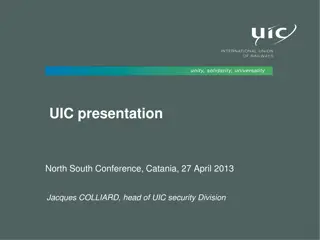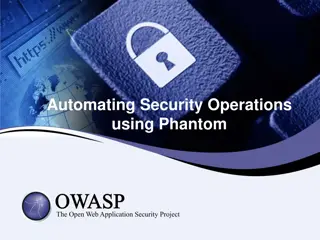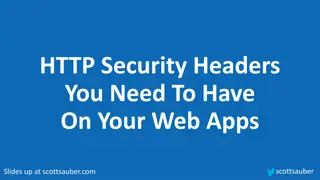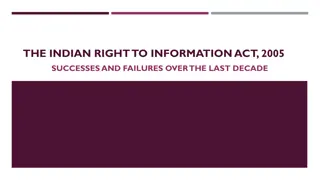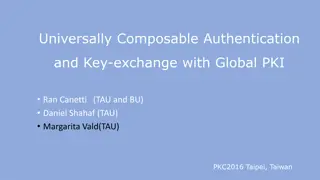Insights on Information Security: A Decade in Review
Reflecting on accidental hacking, hard problems, and the human angles of security in the past decade. Discussing the art and science of information security, surviving in infosec, the skills gap, and the challenges of securing cyberspace.
Download Presentation

Please find below an Image/Link to download the presentation.
The content on the website is provided AS IS for your information and personal use only. It may not be sold, licensed, or shared on other websites without obtaining consent from the author. Download presentation by click this link. If you encounter any issues during the download, it is possible that the publisher has removed the file from their server.
E N D
Presentation Transcript
HALF A DECADE IN REVIEW ON ACCIDENTAL HACKING AND THE HARD PROBLEMS
$WHOAMI @cubes_n_spheres Pentesting, healthcare, etc. Do I get a degree yet? Ya I doooo The human angles of security: politics/sociology/economics/biotech/cyberwarfare/etc. Also I like other stuff
BUT $WHOAMI ACTUALLY AND WHY ALL OF THIS IS A HUGE ACCIDENT
Information security is just as much an art as it is a science
RECIPE FOR SURVIVING INFOSEC Blood Sweat Crying @ 4am
THE SKILLS GAP AND THE ALL TOO COMMON STORY ABOUT BEING THE MOST QUALIFIED PERSON IN THE ROOM
BEING THE ACCIDENTAL EXPERT VP of Senior Me, a lowly Infosec student Privacy & Security Infosec Analyst
~ 1.5 million by 2019 (Symantec) ~ 2 million by 2019 (ISACA) ~ 3.5 million by 2021(ISC2) THE SKILLS GAP, ENUMERATED 2015 2016 2019
THE THING ABOUT CYBERSPACE Infosec Digital Technology Everything (Not enough people to secure the lot of things) (A lot of things) Primary consequence: a lot of things are insecure
OTHER ISSUES RELATED TO THE SKILLS GAP BURNOUT HEALTH DIVERSITY EDUCATION MEDIA
ON HEALTH, MENTAL HEALTH, & BURNOUT AND WHY MORE COFFEE AND BOOZE AREN T THE ANSWER
SOME REASONS FOR BURNOUT low personal efficacy mixed with high cynicism Remote work == lonely? Industry moves fast but initiatives move slow Constant anxiety about getting pwned No other silo likes security
ALSO, THE PHYSICAL CONSEQUENCES Sitting too much; posture Using a mouse/phone constantly Seeing a screen constantly Bluelight
ALSO, THE NEUROLOGICAL CONSEQUENCES Coping with InfoSec hell Cortisol receptors Stress Fight or flight Coincidentally, the same receptors affected by Coffee Alcohol
THE MANY FACES OF STRESS Emotional symptoms Physical symptoms Cognitive effects Anxiety Racing thoughts Forgetfulness, disorganization Difficulty focusing Poor judgement Cynicism Being moody Feeling overwhelmed Can t relax Low self esteem Depression Self-isolation Low energy Headaches Stomach problems Muscle pains/aches/tenseness Chest pain, heart problems Insomnia Lowered immune system ( the list goes on)
IS INFOSEC ADDICTIVE? AND ARE WE JUST PLAYING THE WORST VIDEO GAME EVER?
SOME THEORIES FOR ADDICTION Disease Model (i.e. genetic disposition) (re: potentially dangerous generalization of personality types drawn to computers ) Reward Centre Hijack (i.e. instant gratification) Self-medication Hypothesis (i.e. coping)
ASPECTS OF WHY Gamification of processes and products used for the job Feelings of duty to job and also community Need to cope whether inside or outside of infosec Social reinforcement
SYMPTOMS OF COMPUTER ADDICTION (AND BY COMPUTER, I MEAN INFOSEC) Staying on much longer than intended Thinking frequently about it Failing to cut back Hiding extent of use Using as an escape Missing out on time with other people/things/etc.
THE BOTTOM LINE Work more make up for the Skills Gap Burnout 0% productivity Not a typical boardroom conversation An unsustainable model Solutions?
THE DIVERSITY PROBLEM WHY THE 3.5 MILLION-PERSON GAP COULD USE A BIT A LOT OF HELP
DIMENSIONS OF DIVERSITY The gender gap 2013-2017: 11% of women in global workforce (ISC2, etc.) 2019: 24% of women in global workforce (ISC2) Racial diversity 2016: 26% of minorities in global workforce (ISC2) 2017: 39% of minorities in large corporations (Information is Beautiful)
ITS NOT JUST ABOUT FEELINGS Diversity quotas & the talent race Development of security controls & resulting biases Again, the Skills Gap
DIVERSITY QUOTAS Aggressively marketed opportunities for minorities Perception of being hired for the quota Being only asked to represent the diversity problem Resulting contention Balanced ratio no contention
THE BIGGER PICTURE We need a lot of people Minority groups don t get as much social opportunity/encouragement Why don t we just solve two problems at once?
EDUCATION & INFOSEC WHAT HAPPENS WHEN ACADEMIA LOSES THE EDUCATIONAL ARMS RACE
THE TRADITIONAL DICHOTOMY Contemporary InfoSec Hacking Academia Offensive mindset Actual OG hacking Defensive and offensive Subcultural; anti-institution Defensive mindset Artful Pro-institution Pro-institution After coining hacking , but before contemporary InfoSec Not seen as artful/edgy per se Admires creativity But lacks history Conclusion: Education is perpetually playing catch up to try to meet the Skills Gap (also educational institutions are self-interested businesses)
EXPECTED DEMOGRAPHIC OF PROFESSORS Profs who are experts in the subject area they are teaching
ACTUAL DEMOGRAPHICS OF PROFESSORS Profs who were experts in the subject area they taught Profs who were an expert at something infosec related but not what they were teaching Profs who had a degree entirely unrelated to infosec/IT
$$$ AND TEACHING INCENTIVES The barriers of good education when it s versus a corporation that wants to make money: It pays to not teach Credentials required for teaching (1 above rule) Credential quotas Credentials =/= good at teaching Curriculum changes are hard
THE BOTTOM LINE Cynicism, lack of enthusiasm around infosec education Those who could provide quality education not even allowed to teach More difficult to streamline the learning of industry standards + expected skills Doesn t help the Skills Gap, where we arguably need it most
